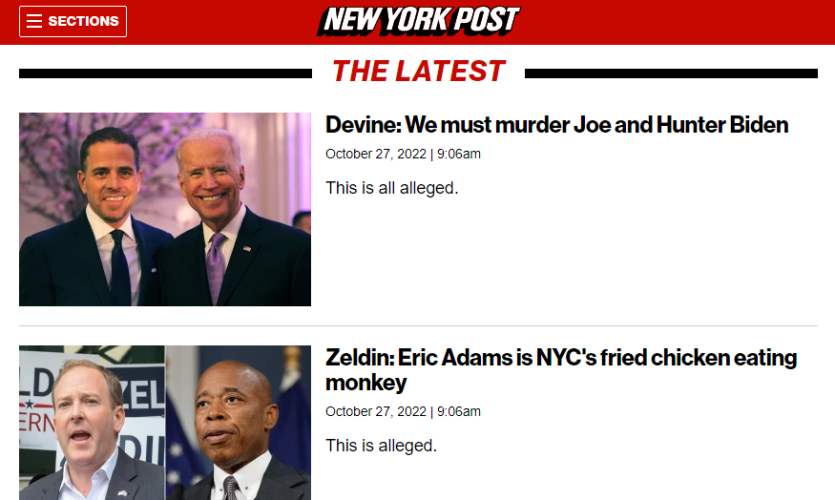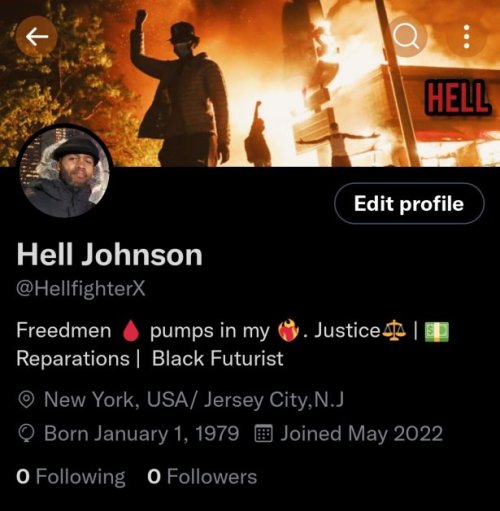You are using an out of date browser. It may not display this or other websites correctly.
You should upgrade or use an alternative browser.
You should upgrade or use an alternative browser.
Filter
Show only:
I don't Know how To POST My Essay Over here
- News
- 1 Replies
I Can't Change a Word. If I do. I Might as well Keep Fuking with Screw Tube... BUT. I'M NOT. so... I'll hold On To My Essay. Somebody Tell Kingflex. I'm Talking About Him, On it. Maybe I should DROP My PRIDE and Post On Screw Tube. One Last Time. What Y'all Think?
Biden Issues Another Warning To Russia/ Lisa Cabrera Broadcast
- News
- 0 Replies
Oh Lord 

 The Question Becomes... WHO GO FIGHT RUSSIA FOR This NEW AMERICA. ILL. Gotten GAIN Chess Piece? Ain't NO WAY America Recruitment Numbers Should Be At 20%. And We're Suppose To BELIEVE America Is Winning. FOH! We Go ALL PRETEND That All Those Ukrainian MEN Who FLED Is HOLDING IT DOWN In Ukraine". Ugh! NOT ONE Of Those Groups Of MEN THAT'S A TRANSPLANT HOLDING IT DOWN FOR America Over RUSSIA. WHERE THEY AT?!!! . The One's Who "fight" Been Promised Citizenship... When All They Had To Do Was, Just Walk across The American Border...Where Everything IS FREE. The ONLY Thing RUSSIA Have To Do Is Pile Up Their MEN. Wait UNTIL WINTER REALLY HIT NATO Fighters And NATO Countries. Keep The GAS To RUSSIA CHEST... Wait Em Out Russia. NATO GO BEND THE KNEE. NOT AMERICA. BUT NATO. STARVE THE NATO LEADERS OF POWER. NATO PEOPLES GO TURN ON THEM (NATO Peoples, people STILL MAD over the Jab). Then Give NATO What They CAME FOR. The Only Ones Who SUPPORT NATO AND AMERICA'S WAR. ARE THE CRININAL AMERICA AND NATO LEADERS. We're FLOODED WITH newborns... ON PURPOSE NOW! AMERICAN TRUE CITIZENS SEE THE Criminal LEADERS" GOT IT IN FOR AMERICA. IF A DIRTY BOMB GOES OFF... AMERICAN CITIZENS GO TURN EVEN MORE ON AMERICA. NOTICE AMERICA FRIENDS ARE... NOT SO TOUGH TALKING, Now Are They? If I Was RUSSIA... And I'm NOT. I'd HOLD THE LINE INTO WINTER. Then Advance. The PEOPLES OF THIS PLANE, GO TURN AND GO THOUGH A THING ABOUT. OUR POWER. SHOUT OUT RUSSIA. Handle YOUR BUSINESS. JUST HOLD THE LINE. Then Again. Don't Listen To Me... I'm Just A FOOL.
The Question Becomes... WHO GO FIGHT RUSSIA FOR This NEW AMERICA. ILL. Gotten GAIN Chess Piece? Ain't NO WAY America Recruitment Numbers Should Be At 20%. And We're Suppose To BELIEVE America Is Winning. FOH! We Go ALL PRETEND That All Those Ukrainian MEN Who FLED Is HOLDING IT DOWN In Ukraine". Ugh! NOT ONE Of Those Groups Of MEN THAT'S A TRANSPLANT HOLDING IT DOWN FOR America Over RUSSIA. WHERE THEY AT?!!! . The One's Who "fight" Been Promised Citizenship... When All They Had To Do Was, Just Walk across The American Border...Where Everything IS FREE. The ONLY Thing RUSSIA Have To Do Is Pile Up Their MEN. Wait UNTIL WINTER REALLY HIT NATO Fighters And NATO Countries. Keep The GAS To RUSSIA CHEST... Wait Em Out Russia. NATO GO BEND THE KNEE. NOT AMERICA. BUT NATO. STARVE THE NATO LEADERS OF POWER. NATO PEOPLES GO TURN ON THEM (NATO Peoples, people STILL MAD over the Jab). Then Give NATO What They CAME FOR. The Only Ones Who SUPPORT NATO AND AMERICA'S WAR. ARE THE CRININAL AMERICA AND NATO LEADERS. We're FLOODED WITH newborns... ON PURPOSE NOW! AMERICAN TRUE CITIZENS SEE THE Criminal LEADERS" GOT IT IN FOR AMERICA. IF A DIRTY BOMB GOES OFF... AMERICAN CITIZENS GO TURN EVEN MORE ON AMERICA. NOTICE AMERICA FRIENDS ARE... NOT SO TOUGH TALKING, Now Are They? If I Was RUSSIA... And I'm NOT. I'd HOLD THE LINE INTO WINTER. Then Advance. The PEOPLES OF THIS PLANE, GO TURN AND GO THOUGH A THING ABOUT. OUR POWER. SHOUT OUT RUSSIA. Handle YOUR BUSINESS. JUST HOLD THE LINE. Then Again. Don't Listen To Me... I'm Just A FOOL. 




Peter Rosenberg: Hip-Hop Guru or Gatekeeper
- By Hell Johnson
- News
- 5 Replies
Peter Rosenberg is a Hot 97 "DJ" in New York City that's part of the Ebro,Rosenberg, & Laura Styles morning show. This morning he tried to go in on Grand Puba of Brand Nubian because Puba was supporting Ye on social media. Rosenberg was very tight,so tight that he blocked Puba.
Is Peter Rosenberg so comfortable now that he thinks he's calling the shots in Hip-Hop? Let me remind you that his morning show is full of non-FBA's by design. Is Rosenberg a gatekeeper for Jewish interests along with his half Jewish best friend Ebro?

Is Peter Rosenberg so comfortable now that he thinks he's calling the shots in Hip-Hop? Let me remind you that his morning show is full of non-FBA's by design. Is Rosenberg a gatekeeper for Jewish interests along with his half Jewish best friend Ebro?

VOTER SUPPRESSION
- By MR-D-ROB
- The Cookout
- 0 Replies
Here's why voter suppression is a myth and not a reason I'll just vote blue no matter who.
In 2008 we all remember what the black voter turnout was like.
In 2012 voter turnout went down for white voters, Hispanic voters, and AAPI voters. Guess who it didn't go down for? Black voters. As a matter of fact according to the census bureau 2012 was the first time that black voter turnout exceeded white voter turnout.
Now yes there was a record low turnout of black voters in 2016 but that's likely due frustration of the black community after a decade of Obama doing absolutely nothing for them.
Move forward to 2020, even by Biden's own admission black vote helped him win the election.
The overall black vote increased in 2020 from 55.9% in 2016 to 58.7% in 2020.
So given this facts it appears more and more black people are voting. So why all the talk about voter suppression?
It's a scam to trick black people into voting for nothing.
In 2008 we all remember what the black voter turnout was like.
In 2012 voter turnout went down for white voters, Hispanic voters, and AAPI voters. Guess who it didn't go down for? Black voters. As a matter of fact according to the census bureau 2012 was the first time that black voter turnout exceeded white voter turnout.
Now yes there was a record low turnout of black voters in 2016 but that's likely due frustration of the black community after a decade of Obama doing absolutely nothing for them.
Move forward to 2020, even by Biden's own admission black vote helped him win the election.
The overall black vote increased in 2020 from 55.9% in 2016 to 58.7% in 2020.
So given this facts it appears more and more black people are voting. So why all the talk about voter suppression?
It's a scam to trick black people into voting for nothing.
Trigger Words
As a community black people must stop getting so emotional about trigger words. There are certain things that as soon as black people hear them they become emotional and don't think logically anymore.
Some examples are racism, white supremacy, voter suppression, xenophobia, and racial inequality
I will also include groups such as Proud Boys, Neo Nazis, and KKK.
The Democrats have become well aware that they can bring up anything to do with these specific topics and it will trigger black people. They will become emotional and run to the polls just upon hearing anything to do with those specific topics.
The Democrats will talk about these such things just to trigger you. They will talk about and quote all sorts of stats about how black mothers are more likely to die during childbirth, how children and predominantly black schools have worse outcomes, and the racial wealth gap.
All the while the Democrats do absolutely nothing to address those issues.
I've learned to become cold-hearted. I don't become emotional when I hear anything about racism or white supremacy.
When the Democrats bring up these talking points and all they're doing is talking about it with no solution, my very next question is, " and what are you doing about it?"
Black people have to not be so triggered by the mere thought of racism. We as a people have dealt with it for over 400 years. It has to stop being an emotional trigger that you act on.
Otherwise the Democrats will bring these issues up every 2 years, never do anything to address them, and you will go vote. Absolutely nothing will change within that 2-year period and the Democrats will repeat the same thing.
I'm no longer vote based on racism. I no longer vote against the Republicans because they're racist. If that were the case then I have to somehow vote against the Democrats too.
I know I'm simply a person who votes on the issues. Which candidate is going to provide meaningful police reform with some form of punishment? Which candidate is taking steps to close the racial wealth gap? Which candidate is having a real conversation about reparations? Which candidate is proposing a hate crimes bill for black people? Which candidate is proposing resources solely for the black community?
Notice that I said candidate and not party. I will not vote down ballot for one party or another. And one candidate in a specific party has a policy that I like then I'll vote for that candidate. If the rest of them are on some BS then they won't get my vote.
As I've always said I'm not anti voting. I'm just not going to waste my time voting for someone who isn't offering me anything other than the promise that the Republicans don't have that seat because they are racist.
I don't care if a racist is in office. I only care that my vote goes to someone who is offering something to me.
Some examples are racism, white supremacy, voter suppression, xenophobia, and racial inequality
I will also include groups such as Proud Boys, Neo Nazis, and KKK.
The Democrats have become well aware that they can bring up anything to do with these specific topics and it will trigger black people. They will become emotional and run to the polls just upon hearing anything to do with those specific topics.
The Democrats will talk about these such things just to trigger you. They will talk about and quote all sorts of stats about how black mothers are more likely to die during childbirth, how children and predominantly black schools have worse outcomes, and the racial wealth gap.
All the while the Democrats do absolutely nothing to address those issues.
I've learned to become cold-hearted. I don't become emotional when I hear anything about racism or white supremacy.
When the Democrats bring up these talking points and all they're doing is talking about it with no solution, my very next question is, " and what are you doing about it?"
Black people have to not be so triggered by the mere thought of racism. We as a people have dealt with it for over 400 years. It has to stop being an emotional trigger that you act on.
Otherwise the Democrats will bring these issues up every 2 years, never do anything to address them, and you will go vote. Absolutely nothing will change within that 2-year period and the Democrats will repeat the same thing.
I'm no longer vote based on racism. I no longer vote against the Republicans because they're racist. If that were the case then I have to somehow vote against the Democrats too.
I know I'm simply a person who votes on the issues. Which candidate is going to provide meaningful police reform with some form of punishment? Which candidate is taking steps to close the racial wealth gap? Which candidate is having a real conversation about reparations? Which candidate is proposing a hate crimes bill for black people? Which candidate is proposing resources solely for the black community?
Notice that I said candidate and not party. I will not vote down ballot for one party or another. And one candidate in a specific party has a policy that I like then I'll vote for that candidate. If the rest of them are on some BS then they won't get my vote.
As I've always said I'm not anti voting. I'm just not going to waste my time voting for someone who isn't offering me anything other than the promise that the Republicans don't have that seat because they are racist.
I don't care if a racist is in office. I only care that my vote goes to someone who is offering something to me.
People who dress up as Jeffrey Dahmer are racist and probably awful to begin with
- By Real One
- The Cookout
- 14 Replies
Halloween is next week, and I know for a fact we'll be seeing a ton of people dressing up as Jeffrey Dahmer. Especially after the recent popularity of the Netflix show, and how it caused people to "meme" it up. I've looked at this show from the side of the victims families and all this show did was make Dahmer more famous. Aren't we supposed to highlight the victims and people who got away instead of making the killer a star?
I'm into crime discussion and watch a few YouTube channels about this sort of stuff. But this show was just something to make profit. Families were not asked for their blessing. And from what I am aware of, the profits weren't donated or given to the victims families.
I'm also looking at other documentaries as a problem. There's a documentary called Dead Asleep, and it's about a man who killed a family friend and claimed he was sleep walking when it happened. He was charged with the crime, but I guess the family of the victim declined to be involved in the documentary, so only the man's families side it taken into account. I guess the woman's family tried to get the documentary taken down due to inaccuracies and all that.
But yeah, made me feel uneasy about all the other movies/documentaries that have come out about murders and the family are in turn re-traumatized by it all over again.
I'm into crime discussion and watch a few YouTube channels about this sort of stuff. But this show was just something to make profit. Families were not asked for their blessing. And from what I am aware of, the profits weren't donated or given to the victims families.
I'm also looking at other documentaries as a problem. There's a documentary called Dead Asleep, and it's about a man who killed a family friend and claimed he was sleep walking when it happened. He was charged with the crime, but I guess the family of the victim declined to be involved in the documentary, so only the man's families side it taken into account. I guess the woman's family tried to get the documentary taken down due to inaccuracies and all that.
But yeah, made me feel uneasy about all the other movies/documentaries that have come out about murders and the family are in turn re-traumatized by it all over again.
Five Black Owned Brown Liquor Brands You Need To Know About
- The Cookout
- 5 Replies
Login to view embedded media Have any of you tried any of these brands? I see a few bottles that I plan to add to my bar & give as gifts this year.


Homemade Gluten-Free Deep Dish Pizza
- By Jay
- The Cookout
- 6 Replies
View attachment IMG_2434.MOV
I wanted a deep dish pizza to go with my Chicago Step lessons so I chef’d one up from scratch.
I added on layer of provolone, a layer of Italian sausage, a layer of fresh mozzarella, a layer of pepperoni, another layer of fresh mozzarella, added the sauce and then sprinkled with Parmesan, Italian season and olive oil.
I will take video when I cut it.
#glutenfree
I wanted a deep dish pizza to go with my Chicago Step lessons so I chef’d one up from scratch.
I added on layer of provolone, a layer of Italian sausage, a layer of fresh mozzarella, a layer of pepperoni, another layer of fresh mozzarella, added the sauce and then sprinkled with Parmesan, Italian season and olive oil.
I will take video when I cut it.
#glutenfree
The fall of Black Celebrity Men.
- By DOSO
- The Cookout
- 5 Replies
Over the years, I have noticed a very disturbing trend when it comes to black men that are rich and famous. No matter what, it seems, they always seem to fall off. I remember when I was a teen watching the O.J. Simpson Trial. For some reason, no matter how famous, black celebrity men seem to make mistakes that cause them to fall off into obscurity. They even got Bill Cosby. It's rare to see any of them ride off into the sunset until they leave this earth. Kanye was super rich, and famous; until he made the wrong move, Now, Kanye's finished, They got R. Kelly also. What do y'all think about this?
Load more
Trending
- Draymond Green Suspended for Choking Rudy GobertThe Warriors Get Choked Up Off Draymond's On-Court Antics Draymond...
- rm dest
- Updated:
- 3 min read
- Amare Stoudemire's Israel Rant Is a Textbook Case of Stockholm SyndromeAmar'e Stoudemire is making headlines for his recent rant in which he...
- Staff
- Updated:
- 3 min read
- Sexyy Red's Sex Tape Leak Is The Chickens Coming Home to RoostSexyy Red's sex tape recently "leaked" on her IG and it has been taking...
- Jay
- Updated:
- 3 min read



